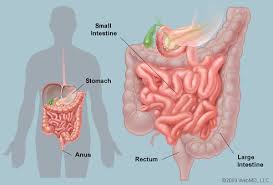记忆方法
将“intestine”拆分为“in-ter-stine”。想象“in”表示“在里面”,“ter”类似于“terri”或“terrain”,联想为“领土”或“区域”,“stine”则像是“stone”的缩短版,想象一截肠道就像一截石头般固定在某个“领土”或“区域”内。这样的形象可以帮助记忆单词“intestine”表示的意思是“肠道”。
以上内容由AI生成, 仅供参考和借鉴
中文词源
intestine 肠
来自拉丁语intus,在内部,在里面,词源同enter,enteritis.引申词义肠。
英语词源
- intestine (n.)
- early 15c., from Middle French intestin (14c.) or directly from Latin intestinum "a gut," in plural, "intestines, bowels," noun use of neuter of adjective intestinus âinward, internalâ (see intestines). Distinction of large and small intestines in Middle English was made under the terms gross and subtle. The word also was used as an adjective in English from 1530s with a sense of âinternal, domestic, civil.â
权威例句
- 1. This drug lowers cholesterol levels by binding fats in the intestine.
- 这种药通过黏合肠内的脂肪降低胆固醇水平。
- 2. the viscid lining of the intestine
- 肠黏膜
- 3. The tapeworm is an inhabitant of the intestine.
- 绦虫是栖居肠内的寄生虫.
- 4. The function of the stomach is to digest food sufficiently to enable it to pass into the intestine.
- 胃的功能是充分消化食物,以便让其进入肠道.
- 5. This vitamin is absorbed through the walls of the small intestine.
- 这种维生素通过小肠壁被吸收。
